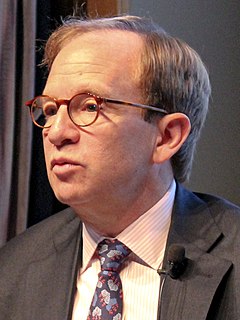A Quote by Seth Moulton
Prior to the 2008 recession, many financial institutions were engaging in 'proprietary lending,' where a bank would invest funds for its own gain instead of earning revenue through commission by trading on behalf of clients.
Related Quotes
Let's stop for a second and remember where we were eight years ago [in 2008]. We had the worst financial crisis, the Great Recession, the worst since the 1930s. That was in large part because of tax policies that slashed taxes on the wealthy, failed to invest in the middle class, took their eyes off of Wall Street, and created a perfect storm.
The poverty we see in America is now too widespread, and too complex, for easy fixes. But I do think we can reimagine many of our institutions and can create new ones in ways that would be effective. We could, for example, create social insurance systems, similar to social security, such as that we went through in 2008-9. We could create a financial transaction tax, oil profit taxes and a fairer estate tax system, and we could plow much of the revenue raised from these into job training programs, into better education infrastructure, into an expanded Earned Income Tax Credit.
We need a federal government commission to study the way our financial services system is working - I believe it is working badly - and we also need more educated investors. There are good long term low-priced mutual funds - my favorite is a total stock market index fund - and bad short term highly priced mutual funds. If investors would get themselves educated, and invest in the former - taking their money out of the latter - we would see some automatic improvements in the system, and see them fairly quickly.
The problems of 2008 were never cured. The Federal Reserve's solution to the crisis was to lend the economy enough money to borrow its way out of debt. It thought that if it could subsidize banks lending homeowners enough money to buy houses from people who are defaulting, then the bank balance sheets would end up okay.
Throughout the Great Recession of 2008, the average 401(k) balance lost anywhere from 25 to 40 percent of value. Nobody was more harmed than baby boomers or recent retirees, who, unlike younger workers, didn't have the time for the market to rebound or were no longer contributing and therefore unable to invest when stocks were cheap.
The public are entitled to have an absolute guarantee of the financial probity and integrity of their elected representatives, their officials and above all of Ministers. They need to know that they are under financial obligations to nobody, other than public lending institutions, except to the extent that they are publicly declared.
































